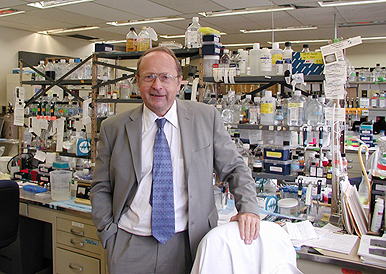Lessons learned from the influenza pandemic of 1918
Bicknell lectures at SPH look at deadly flu strains of past and present

As the threat of an influenza pandemic — real or perceived — begins coursing through the public’s consciousness, Peter Palese hopes to set a few things straight. Palese (pictured above) is one of five scientists participating in a two-day lecture series at the School of Public Health this week titled Pandemic Influenza: 40 Million Died in 1918 — What Have We Learned?
The William J. Bicknell Lectureship in Public Health is scheduled for Thursday afternoon and Friday morning in Bakst Auditorium on the Medical Center Campus, 715 Albany St., Boston.
Palese is chairman and a professor in the department of microbiology at Mount Sinai School of Medicine in New York. He’ll be speaking from 4 to 6 p.m. tomorrow on Influenza: Old and New Threats.
His talk will focus on the history of the 1918 influenza pandemic. It’s different from avian bird flu present in Asia, known as H5N1, he says, partly because avian bird flu doesn’t yet have the potential to spread from human to human.
“What is remarkable is how virulent it is in chickens,” he says. H5N1 may be deadly to chickens and to humans — the virus has also claimed human lives — but that’s not what makes a pandemic. The flu that killed more than 40 million people in 1918 was “more virulent than any other human virus,” Palese says, and it infected a population that had never been exposed to anything like it and had no immunity to such a strain. If H5N1 were to mutate into something that could spread from person to person, a pandemic is quite possible.
“Conditions are favorable for the emergence of a dangerous pandemic variant of the influenza virus, and preparedness to deal with such an event remains fragmented, under-funded, and weak,” says Gerald T. Keusch, SPH associate dean for global health, assistant provost of the MED campus and organizer of the lecture event.
“The Bicknell lectures will give the public health community, as well as private citizens, the chance to learn about the threat and consider ways to improve preparedness,” he says.
Palese says that vaccines available today could help. One thing learned since the 1918 pandemic is that vaccines and other drug treatments do work, and their effectiveness is sometimes underestimated. Today’s drugs could even combat the flu of 1918. The challenge, he says, is in creating enough vaccine to prevent a pandemic. Each dose of vaccine to prevent H5N1 in humans is created from one chicken egg. To produce 100 million doses of the vaccine in three months would require three million eggs a day — a tall order. “That’s why people are justified in the stockpiling of vaccines,” he says.
John M. Barry, a distinguished visiting scholar at the Center for Bioenvironmental Research at Tulane University is scheduled to give the Bicknell lecture on Friday at 9 a.m. His lecture, Nature Against Man: Lessons from the 1918 Pandemic, will be followed by a panel discussion with George Annas, the Edward R. Utley Professor of Health Law Bioethics and Human Rights at SPH and chairman of the department of health law, bioethics and human rights; Alfred DeMaria, Jr., assistant commissioner for the Massachusetts Department of Public Health and director of the Bureau of Communicable Diseases, and Lone Simonsen, senior epidemiologist at the Office of Global Affairs of the National Institute of Allergy and Infectious Diseases.
Barry’s 2004 book, The Great Influenza: The Epic Story of the Deadliest Plague in History, was reportedly one of three books on President Bush’s summer reading list this year. It highlights one of the pandemic’s first catastrophes at Fort Devens, a U.S. Army base in Ayer, Mass. where thousands of previously healthy young soldiers suddenly became critically ill and began dying by the hundreds. Barry is also the author of Rising Tide: The Great Mississippi Flood of 1927 and How It Changed America.
The William J. Bicknell Lectureship in Public Health was established at SPH in 1999 to bring lectures by stimulating iconoclasts and original thinkers to the school to stretch the minds of students and faculty. The lectureship is endowed by a gift from William J. Bicknell, founding chairman of the department of international health. Bicknell is a professor of international health at SPH and professor of family medicine and sociomedical sciences and community medicine at MED.